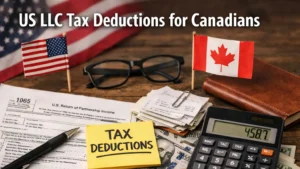Canadian residents who own property in the United States can explore an enticing opportunity, with the potential for a lucrative investment and the option to acquire a second home or rental property in a sought-after location. However, owners must actively grasp the tax implications for Canadians owning US property.
These tax implications carry significant weight, directly affecting their financial status and the overall success of their investment. In this listicle, we will examine seven crucial considerations of tax implications for Canadians owning US property.
Unlock the potential of your US property investment while navigating tax implications with confidence. You can trust SAL Accounting for expert guidance and tax optimization solutions.
Table of Contents
- Non-Resident Tax Implications for Canadians Owning US Property
- Rental Income
- Capital Gains Tax for Canadian Property Owners in the US
- Estate Tax Considerations for Canadian Property Owners in the US
- Reporting Requirements for Canadian Owners of US Property
- Withholding Tax Implications
- State-Level Tax Considerations
- Take Away
- FAQs
Non-Resident Tax Implications for Canadians Owning US Property
Understanding the tax implications for Canadians Owning US Property is crucial, particularly when you find yourself in the unique position of being a non-resident taxpayer in the United States.
As a Canadian investor in US real estate, you fall under the non-resident status, which carries distinct tax rules compared to those applicable to US citizens and residents. In this section, we’ll delve into the implications of this status on your financial obligations and responsibilities.
Canadian Property Owners in the US
When Canadians decide to invest in real estate in the United States, they typically take on the status of non-resident taxpayers for the US tax system. This is because they do not reside in the US and own property primarily for investment purposes, rather than for personal use or residency.
As non-residents, Canadian property owners are subject to specific taxation rules and considerations that differ from those applied to US citizens and residents.
Taxation Implications
The non-resident status holds significant implications, especially in the context of taxation. Under this classification, the United States tax authorities have the authority to levy taxes on income generated from US properties owned by Canadians.
This encompasses various sources of income, such as rental income, capital gains, and other forms of revenue associated with the US property. Essentially, as a non-resident, you are legally obliged to report and pay taxes on these income sources according to the prevailing US tax laws and regulations.
In conclusion, being a non-resident Canadian property owner in the US comes with a set of tax considerations that warrant your attention. From the taxation implications to the nuances of rental income, it’s vital to stay informed and compliant with both US and Canadian tax laws. By navigating the tax landscape with clarity and expert guidance, you can effectively manage your investments and make the most of the tax treaty provisions designed to safeguard your interests.
Rental Income
Rental income forms a significant part of the financial landscape for many Canadian property owners in the United States. However, with this income source comes the responsibility of adhering to US income tax regulations.
In this section, we’ll explore the intricacies of US income tax on rental income and how it affects Canadians who rent out their US properties.
US Income Tax on Rental Income
One of the primary sources of income for many Canadian property owners in the US is rental income. When you opt to rent out your US property to tenants, you must adhere to the US tax system.
This means that you become subject to US income tax on the rental income you earn from your tenants. To ensure compliance with US tax laws, you must diligently maintain records of your rental income and related expenses, which is essential for accurate tax reporting.
Tax Treaty with Canada
The good news is that there is a tax treaty in place between Canada and the United States designed to mitigate the potential issue of double taxation. Double taxation can occur when the same income is subject to tax in the country where it is earned (in this case, the US) and the taxpayer’s home country (Canada). This situation can be financially burdensome and discourage cross-border investments.
Foreign Tax Credit
Under the provisions of the Canada-US tax treaty, Canadian property owners who generate rental income from their US properties can typically claim a foreign tax credit in Canada. This credit serves as a financial mechanism that allows you to offset the US taxes you have paid on your rental income. In other words, you are not subjected to taxation on the same income in both the United States and Canada.
To sum it up, generating rental income has tax implications for Canadians owning US property that necessitate your vigilance. Understanding the US income tax obligations tied to your rental income and leveraging the Canada-US tax treaty’s benefits can make a substantial difference in your financial well-being.
Seeking professional advice and maintaining meticulous records will allow you to navigate these complexities, ensuring compliance with tax laws and optimal management of your investments.
Capital Gains Tax for Canadian Property Owners in the US
Capital gains tax is a crucial consideration for Canadians who own property in the United States, particularly when they contemplate selling their US properties. It involves the taxation of profits accrued from the sale of an asset, in this context, their US property.
Canadian property owners in the US must be well-versed in capital gains tax, especially when it comes to selling their US properties. This tax applies to the profit earned from the sale of an asset, which, in this context, pertains to your US property. Given below are some tax obligations you need to understand to have a clear idea about Capital gains tax for Canadian property owners in the US.
Dual Tax Obligations
When deciding to sell your US property, it’s essential to recognize that you might face capital gains tax obligations in both the United States and Canada. This necessitates a comprehensive understanding of the implications associated with capital gains taxation in both countries.
US Capital Gains Tax Rates
In the United States, the tax rate applied to your capital gains is typically determined at the federal level and can fall within the range of 15% to 20%. The specific rate is contingent upon your annual income, with those earning more often subject to the higher tax rate. As a result, adequate preparation is crucial to ensure the proper reporting and payment of capital gains tax to the Internal Revenue Service (IRS) when selling your US property.
Canadian Tax Treatment
In Canada, capital gains are taxed according to your regular income tax rate. This means that your capital gains are considered part of your overall income and will be subject to taxation at your applicable income tax rate. However, it’s worth noting that Canada frequently allows for the claiming of a foreign tax credit, which serves to prevent double taxation.
This credit enables you to offset the Canadian taxes you owe on your capital gains with the US taxes already paid, ensuring that you aren’t taxed twice on the same gain.Dual tax obligations in both the United States and Canada necessitate a comprehensive grasp of capital gains taxation implications. Recognizing the US capital gains tax rates and the potential for claiming a foreign tax credit in Canada is vital for efficient tax planning. Proper preparation ensures that Canadian property owners can sell their US properties with confidence, avoiding the burden of double taxation.
Estate Tax Considerations for Canadian Property Owners in the US
Estate tax is a significant concern for Canadian residents who own property in the United States, particularly when planning their estates. The US imposes an estate tax on the transfer of an individual’s property after their passing, requiring careful consideration and strategic planning.
Estate Tax in the US
The United States imposes an estate tax, which can be substantial and requires proactive planning. The tax rate and exemption threshold can fluctuate, but it typically applies to the overall value of your estate, including your US property.
US-Canada Tax Treaty Relief
Fortunately, the US-Canada Tax Treaty provides relief for Canadians. It introduces an exemption threshold designed to safeguard smaller estates from the US estate tax, potentially sparing heirs from this tax burden.
Estate Planning for Larger Estates
For larger estates, strategic estate planning is often essential to minimize the impact of the US estate tax and ensure a more tax-efficient transfer of assets to heirs.
The US-Canada Tax Treaty offers relief in the form of exemption thresholds, protecting smaller estates from the US estate tax. However, for larger estates, proactive estate planning is essential to minimize the impact and ensure a tax-efficient transfer of assets. Understanding the tax implications for Canadians owning US property is pivotal for Canadian property owners looking to safeguard their legacies and the financial well-being of their heirs.
Reporting Requirements for Canadian Owners of US Property
For Canadians who own property in the United States, understanding the intricate web of reporting requirements is vital. This is particularly crucial when considering the tax implications of their investments in US real estate.
These reporting obligations encompass various aspects of their financial situation tied to their US property, making compliance a critical part of their ownership journey.
Compliance Obligations
Canadian individuals who own property in the United States must fulfil specific reporting requirements to manage the tax implications of their cross-border investments. These obligations encompass various aspects of their financial situation tied to their US property.
Annual IRS Tax Return
You are obligated to actively file an annual tax return with the Internal Revenue Service (IRS), the US tax authority. Within this return, they must report crucial financial information, including their rental income and capital gains arising from their US property.
Failure to meet these reporting requirements can lead to financial penalties and interest charges, making it essential to handle these responsibilities diligently and maintain accurate records for precise reporting.
Navigating the tax implications for Canadians owning US property necessitates fulfilling specific reporting obligations. These include the filing of an annual tax return with the Internal Revenue Service (IRS) and reporting rental income and capital gains from their US property.
Vigilance in managing these responsibilities is essential, as non-compliance may lead to financial penalties and interest charges.
Withholding Tax Implications
Selling a US property as a Canadian property owner involves delving into the complexities of withholding tax implications. Understanding this process is vital, especially concerning the tax prepayment requirements for purchasers of US properties. Canadian sellers need to be aware of their options for potentially reducing or eliminating this withholding tax burden.
Tax Prepayment
When Canadians decide to sell their US property, they need to be aware of the potential withholding tax implications for Canadians owning US property. In this scenario, the purchaser of their US property may be required to withhold a specific percentage of the sale price as a tax prepayment.
Applying for a Withholding Certificate
Canadian sellers have the option to apply for a withholding certificate to potentially reduce or eliminate this withholding tax burden. However, it’s crucial to recognize that the process of obtaining a withholding certificate can be intricate and time-consuming.
Successful completion of the application process requires careful attention to detail and the fulfilment of specific criteria, emphasizing the importance of initiating this process well in advance of the property sale.
The withholding tax implications for Canadians owning US property underscore the significance of proactive planning for Canadian property owners selling US real estate. While the withholding tax may be a mandatory prepayment, Canadian sellers have the opportunity to apply for a withholding certificate to alleviate the tax burden. However, the application process is intricate and time-consuming, requiring meticulous attention to detail and adherence to specific criteria.
State-Level Tax Considerations
The intricacies of state-level tax considerations add another layer of tax implications for Canadians owning US property. Diverse US states have their distinct tax regulations and rates that can significantly impact the tax implications of Canadian property ownership. Understanding these state-level tax nuances is critical for informed decision-making.
Diverse State Tax Regulations
Understanding the intricate web of state-level taxes is of paramount importance for Canadians who own property in the United States. Various US states maintain their distinct tax regulations and tax rates that can exert a substantial impact on the overall tax implications faced by Canadian property owners.
Location-Dependent Tax Impact
The specific influence of state-level taxes hinges on the location of their property. Canadian property owners must actively acquaint themselves with the tax laws of the state where their property is situated. This knowledge is vital for ensuring compliance and making well-informed financial decisions.
Varied Tax Landscape
State-level taxes can vary significantly, thus potentially affecting the financial considerations tied to the ownership and sale of US property. Engaging in comprehensive research or seeking professional guidance is recommended to effectively navigate the multifaceted state tax landscape and optimize their financial approach in the context of Canadian ownership of US property.
The state-level tax landscape in the United States presents a unique challenge for Canadian property owners. With varied tax regulations and rates across different states, understanding the tax laws specific to the state where their property is located is essential.
Whether through thorough research or professional guidance, Canadians can successfully navigate this complex terrain and optimize their financial approach in the context of owning US property.
Take Away
In conclusion, investing in US property as a Canadian offers promising opportunities, yet it also presents tax implications for Canadians owning US property. To make the most of this investment while avoiding financial pitfalls, consulting cross-border tax experts, staying updated on tax regulations in both the US and Canada and diligently adhering to reporting and compliance requirements are essential steps for success.
FAQs
Do I need to file US tax returns if I own property in the United States but live in Canada?
Yes, Canadian residents with US property must file US tax returns, reporting rental income, capital gains, and other income generated from the property.
Are there any tax treaties between Canada and the United States to prevent double taxation?
Yes, a tax treaty exists, allowing Canadian residents to claim a foreign tax credit in Canada to offset US taxes on income and capital gains from their US property.
What is the current estate tax situation for Canadians owning US property?
The US has an estate tax, but the US-Canada Tax Treaty provides exemptions to protect smaller estates from substantial estate tax liabilities.






